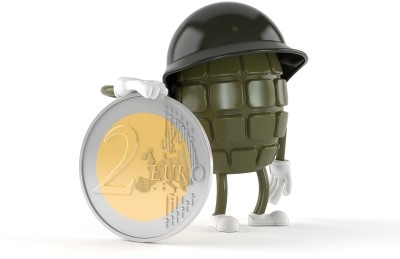14 July, 2013
More Like a War on Choice
There is a War on Cash, or so we are told. Not one of those geo-political wars in search of power and influence and resources, or one of conflicting ideologies, which is what real wars are about. But a one-sided and phoney war over how people pay for things, in which one side of the divide has put aside its differences (up to a point) to take pot shots at those on the other side of the divide – the cash industry – which is by and large ignoring this so-called war.
Whether the cash industry should be doing so is a moot point. How do you respond to an annoying neighbour or colleague – ignore, complain or fight back? On the other hand, there is a biblical saying that ‘the meek shall inherit the earth’ and, as we all know, in reality the meek get trampled on.
That aside, the past few weeks have not been good ones for the cashless fraternity, with a number of reports published demonstrating that cash is not on its way out, as they would have the public believe. Two examples are given in this issue alone (Currency News July 2013) – the report on pages 6 and 7 on the Future for Cash and the statement by the De Nederlandsche Bank which, unusually among central banks who by and large remain neutral on the question of payments – and undoubtedly in response to the aggressive tactics of the cashless community in the Netherlands – has openly said that cash must stay. Several other recent reports also point to the stability and even growth of cash, all of which is leading bloggers and other anti-cash pundits to beg the question ‘are we losing the War on Cash?’
The real question, however, is why they declared a war in the first place. Even those of us involved in cash understand the significant benefits of cards and other forms of cashless payments – convenience being a key one (particularly for travel and routine requirements such as transport cards), virtually universal acceptance globally of the major cards (unless, of course, your card provider doesn’t like the fact that you are in Bangkok when they think you should be in Bogota, and the card gets declined), on-line purchases, large value transactions, less vulnerability to loss or theft and so on.
We understand that, and so does the public. They don’t need well-funded marketing campaigns, let alone macho but juveniles slogans (‘Lets’ Kill cash’ anyone?) to tell them how to pay. Their payment behaviour is decided first and foremost by what suits them and their circumstances. Sometimes it’s cash, sometimes it’s cards, cheques or direct debits, bank transfers of other forms of electronic banking. If the virtues of cards are all that they are cracked up to be, then this form of payment will prevail.
But given that there is a war, then the problem lies in our war chest compared with theirs. Theirs is full of money, ours virtually empty. That money is being spent on advertising, social networking and lobbying (which we all, as card users, pay for). As an industry for cash, we cannot compete with the financial resources of the competition (and let’s call them that, not the ‘enemy’). But we can work more closely together, as the cashless lobby is doing, to make the case for cash – but preferably without the macho posturing.
We don’t need to – as long as our facts are presented fairly (unlike theirs), they will speak for themselves. And then consumers will make their payment choices accordingly, regardless of the phoney war – which is not a war on cash, but a war on choice.










